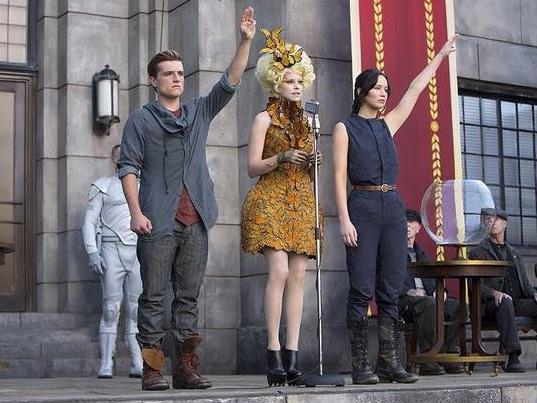Image: Left to right, Peeta Mellark (Josh Hutcherson), Effie Trinket (Elizabeth Banks) and Katniss Everdeen (Jennifer Lawrence).
In the film adaptations of Suzanne Collins’ now famous trilogy, all the world is a game and a stage; in staying true to the famed Shakespearean quote, however, all the characters – and viewers, too – are merely players. On screen, combatants publicly battle politics as much as each other, their feats of endurance predicated upon not just living, but bringing attention to an unjust system. Off screen, audiences are ushered through the ups and downs of their efforts, made to hang on their every word and move in a movie franchise with still two more instalments.
Thus unravels The Hunger Games: Catching Fire, the second cinema version of the latest best-selling young adult series to fill the Harry Potter and Twilight void. A new behind-the-scenes team brings the continuation to the screen, director Francis Lawrence (Water for Elephants) and writers Simon Beaufoy (Salmon Fishing in the Yemen) and Michael Arndt (Oblivion) casting fresh eyes over familiar material. Indeed, despite the guiding hand of the series debutants, as a new kill-or-be-killed tale rolls out it is the anticipated and repeated that remains.
After conquering the 74th annual Hunger Games, defiant dual District 12 champions Katniss Everdeen (Jennifer Lawrence, Silver Linings Playbook) and Peeta Mellark’s (Josh Hutcherson, Red Dawn) time at the top is far from over, a victory tour through the divided nation of Panem their next official duty. Their countrymen – adoring their new winners, but agitating against their societal status – await signs of their in-game affection, but the love story is just that, a work of fiction fuelled by strategy and furthered by the demands of the cunning President Snow (Donald Sutherland, The Best Offer). And yet, when the damaged duo is called into conflict once more for the 75th outing, their bond reverts to one of mutual preservation.
With its extended opening, The Hunger Games: Catching Fire again establishes the untoward world order of the dystopian setting, one of extreme measures to ensure a system of severe class imbalance, and underhand methods to keep the poor populace in line. Then, with twists of fate to snatch its likeable leads away from their loved ones (including Paranoia’s Liam Hemsworth) and into harm’s way, it channels its Machiavellian misery into the titular contest, this time pitting former winners against each other in the latest survival of the fittest. The template of the first film remains, visits from eccentric aids and allies (Movie 43’s Elizabeth Banks, The Butler’s Lenny Kravitz, Now You See Me’s Woody Harrelson and The Fifth Estate’s Stanley Tucci among them) included. So do the stakes, never less than life or death. The details may change, but little deviates from the formula.
At every point during the film’s 146-minute running time, the game is underway – if not plunging the formerly safe and saved in ill-spirited intentions, but immersing the enthralled viewers in the foreseeable narrative manipulations. Much of both stems not only from the script, or the effective but unremarkable direction, but from the cast that never fails to invest interest into the assemblage of the expected. An Oscar win hasn’t lessened the ever-excellent Lawrence’s stubborn appeal as the reluctant symbol of rebellion, nor does her strong presence dampen Hutcherson’s loyal boy-next-door act as her charming counterpart. Supporting roles, including series newcomers Phillip Seymour Hoffman (Performance) as games master Plutarch Heavensbee and Jena Malone (The Wait) as fellow pawn Johanna Mason, further the performative depth – and the emotional connection forged through watching.
As bleakness and brutality streams from the story, further thrusting audiences into willing engagement, so does contrivance. As more in-battle obstacles are thrown at the archery-savvy heroine and her neighbourly cohort, the more the developments smack of occurrences for interest’s sake only. A sly undercurrent of statement pulses underneath, skewering reality television and celebrity obsession, governmental power and civilian subservience, but little differs from the first effort. That’s The Hunger Games: Catching Fire in a nutshell: its most successful elements have been seen before, its sustaining components – maintaining attention for the inevitable follow-ups – just play their parts. As does the film itself, the game forever in motion.
Rating: 3 stars out of 5
The Hunger Games: Catching Fire
Director: Francis Lawrence
USA, 2013, 146 mins
Release date: 21 November
Distributor: Roadshow
Rated: M
